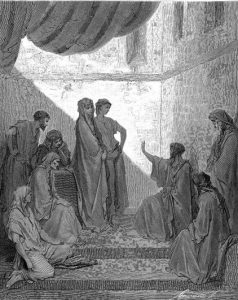Genesis 21:8-21
This text is used for the Lectionary Year A on June 25, 2017.
 Finishing Unfinished Family Business
Finishing Unfinished Family Business
Family. Simply saying the word stirs us. We feel. The feelings differ according to our personal stories, but everyone has strong feelings about “family.” Hopes & fears, laughter & tears, hugs & stare downs are images we see in our mind’s eye. Around family, there is little neutral ground.
A Complex Family
Our memories may include more – joy or sadness, gratitude or regret, praise or anger, awe or disappointment. And for all of us, there is some unfinished family business. This was particularly true of the complex family of Abraham, Sarah, Hagar, Ishmael, and Isaac.
In Genesis, the book of origins & patterns, God has much to teach us about finishing unfinished family business. Genesis 16 and following connected how Hagar entered this family story. She is Sarah’s Egyptian handmaiden and served as a surrogate wife for Abraham. She bore his children because Sarah was barren. When Ishmael (which means “God hears”) is born Hagar taunts Sarah with her ability to do what her mistress could not. This inability haunted Sarah. Enmity grew between them. Abraham led a tension-filled home life. He was torn between a divided loyalty among his wives and children. A divine breakthrough was desperately needed.
Family bonds continue to strengthen and/or weaken us throughout our lives. What enables family to be positive? The key is to accept God’s blessings and to live the best blessing as it was best given by our family of origin. That may also mean to minimize the “curse.” Family issues continue to play themselves out until we deal with them. God’s grace can heal the wounds. And we must live continually beyond what family “shadows” linger.


